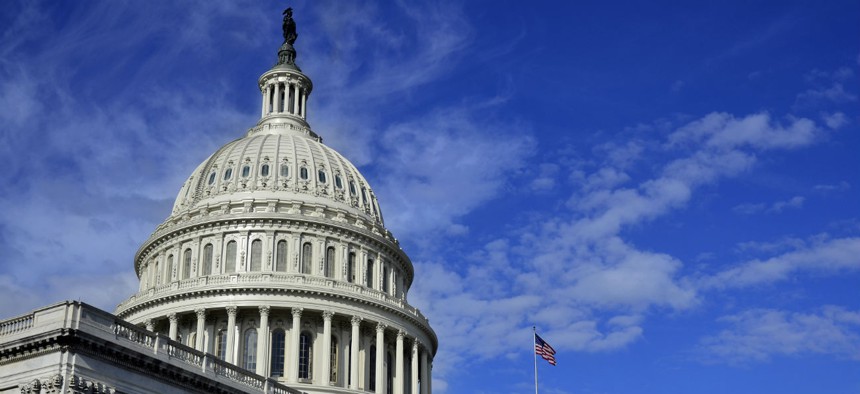
By Lane V. Erickson / Shutterstock.com
House Democrats Urge Leadership to Stand Firm on Union Protections in Spending Bills
More than 200 lawmakers insisted that appropriators protect a House-passed provision blocking agencies from implementing union contracts mandated by the Federal Service Impasses Panel.
More than 200 House Democrats on Thursday urged House leaders not to use a provision protecting federal employee unions as a bargaining chip in spending negotiations with the Senate and the Trump administration.
When the House passed its fiscal 2020 Financial Services and General Government appropriations bill in June, it included language that would block agencies from implementing any collective bargaining agreement that has not been “mutually and voluntarily agreed to by all parties” or was not the result of binding arbitration. The provision is retroactive to April 30, 2019.
Effectively, the provision would block agencies from unilaterally implementing a new contract over union objections, as has happened at the Environmental Protection Agency this summer. It also would block agencies from implementing contracts mandated by the Federal Service Impasses Panel, which has issued a number of pro-management decisions in recent months.
In a letter to House Speaker Nancy Pelosi, Appropriations Chairwoman Rep. Nita Lowey, D-N.Y., and Financial Services and General Government Subcommittee Chairman Rep. Mike Quigley, D-Ill., the lawmakers said the provision is “essential to the protection of fair collective bargaining rights” for federal workers.
“This is the first time in four decades that federal unions have had to come to Congress to ask for the protection of the institution of fair collective bargaining, including their ability to collect union dues and obtain adequate amounts of official time to carry out legally-required representational duties,” the Democrats wrote, led by Rep. Jamie Raskin, D-Md. “Without this provision, the Trump administration will likely succeed in crushing the federal employee unions, making a mockery of the collective bargaining guarantee and rendering the task of effectively representing union members all but impossible.”
The lawmakers argued that Congress needs to step in to protect federal employee unions, since administrative review bodies and the court system thus far have declined to do so. In July, a federal appellate court ruled that it lacked jurisdiction to weigh in on the legality of three workforce executive orders until federal employee unions first took concrete disputes before the Federal Labor Relations Authority.
“As you know, the Trump administration has been waging war against official time, union access to workers and respect for collective bargaining,” the lawmakers wrote. “This boundless hostility to federal employee rights has also come to define the FLRA and FSIP, which have rubberstamped the most punitive, destructive and extreme interpretations of the [statute] and all but ignored its actual terms. It is sad to report but perfectly clear that, under this administration, neither the FLRA nor the FSIP cares what the law says or what legal precedents say.”
In a statement, American Federation of Government Employees National President J. David Cox thanked lawmakers for their support and described the upcoming fight over the appropriations bill provision as “do or die.”
“If Congress fails to act now, there could be nothing preventing the administration from decimating our contracts and stripping federal employees of basic rights and protections at the worksite,” Cox said. “I urge House leaders to protect our democracy by fighting to retain this language in any appropriations bill that becomes law.”
Tony Reardon, national president of the National Treasury Employees Union, also stressed the importance of the bill language.
“It is a sad commentary that such legislation is even necessary, but as long as the administration continues to flout civil service laws with bad faith bargaining and blatantly unfair contract provisions, NTEU will keep up our efforts to restore a productive and healthy relationship between federal employees and agency leaders,” Reardon said.
Congress will return from its August recess Monday. The House and Senate have until Sept. 30 to come to an agreement on appropriations legislation, or risk another government shutdown.







